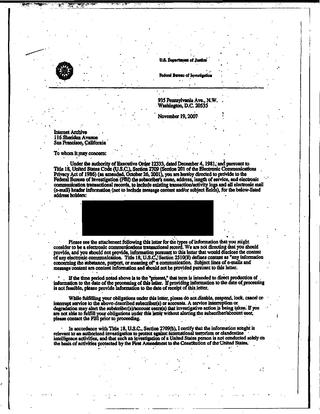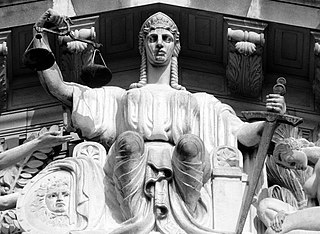
The High Court of Justiciary is the supreme criminal court in Scotland. The High Court is both a trial court and a court of appeal. As a trial court, the High Court sits on circuit at Parliament House or in the adjacent former Sheriff Court building in the Old Town in Edinburgh, or in dedicated buildings in Glasgow and Aberdeen. The High Court sometimes sits in various smaller towns in Scotland, where it uses the local sheriff court building. As an appeal court, the High Court sits only in Edinburgh. On one occasion the High Court of Justiciary sat outside Scotland, at Zeist in the Netherlands during the Pan Am Flight 103 bombing trial, as the Scottish Court in the Netherlands. At Zeist the High Court sat both as a trial court, and an appeal court for the initial appeal by Abdelbaset al-Megrahi.

In English law, natural justice is technical terminology for the rule against bias and the right to a fair hearing. While the term natural justice is often retained as a general concept, it has largely been replaced and extended by the general "duty to act fairly".
The court system of Canada is made up of many courts differing in levels of legal superiority and separated by jurisdiction. In the courts, the judiciary interpret and apply the law of Canada. Some of the courts are federal in nature, while others are provincial or territorial.
In Canadian law, a reference question or reference case is a submission by the federal or a provincial government to the courts asking for an advisory opinion on a major legal issue. Typically the question concerns the constitutionality of legislation.

The Freedom of Information Act 2000 is an Act of the Parliament of the United Kingdom that creates a public "right of access" to information held by public authorities. It is the implementation of freedom of information legislation in the United Kingdom on a national level. Its application is limited in Scotland to UK Government offices located in Scotland. The Act implements a manifesto commitment of the Labour Party in the 1997 general election, developed by David Clark as a 1997 White Paper. The final version of the Act was criticised by freedom of information campaigners as a diluted form of what had been proposed in the White Paper. The full provisions of the act came into force on 1 January 2005. The Act was the responsibility of the Lord Chancellor's Department. However, freedom of information policy is now the responsibility of the Cabinet Office. The Act led to the renaming of the Data Protection Commissioner, who is now known as the Information Commissioner. The Office of the Information Commissioner oversees the operation of the Act.

The courts of Scotland are responsible for administration of justice in Scotland, under statutory, common law and equitable provisions within Scots law. The courts are presided over by the judiciary of Scotland, who are the various judicial office holders responsible for issuing judgments, ensuring fair trials, and deciding on sentencing. The Court of Session is the supreme civil court of Scotland, subject to appeals to the Supreme Court of the United Kingdom, and the High Court of Justiciary is the supreme criminal court, which is only subject to the authority of the Supreme Court of the United Kingdom on devolution issues and human rights compatibility issues.
Australian administrative law defines the extent of the powers and responsibilities held by administrative agencies of Australian governments. It is basically a common law system, with an increasing statutory overlay that has shifted its focus toward codified judicial review and to tribunals with extensive jurisdiction.

A national security letter (NSL) is an administrative subpoena issued by the United States government to gather information for national security purposes. NSLs do not require prior approval from a judge. The Stored Communications Act, Fair Credit Reporting Act, and Right to Financial Privacy Act authorize the United States government to seek such information that is "relevant" to an authorized national security investigation. By law, NSLs can request only non-content information, for example, transactional records and phone numbers dialed, but never the content of telephone calls or e-mails.

The Privacy Act is the federal information-privacy legislation of Canada that came into effect on July 1, 1983. Administered by the Privacy Commissioner of Canada, the Act sets out rules for how institutions of the Government of Canada collect, use, disclose, retain, and dispose of personal information of individuals.

United Kingdom administrative law is part of UK constitutional law that is designed through judicial review to hold executive power and public bodies accountable under the law. A person can apply to the High Court to challenge a public body's decision if they have a "sufficient interest", within three months of the grounds of the cause of action becoming known. By contrast, claims against public bodies in tort or contract are usually limited by the Limitation Act 1980 to a period of 6 years.

R v Commissioner of Police of the Metropolis [2009] UKSC 3, was a 2009 case heard by the Supreme Court of the United Kingdom.
Wednesbury unreasonableness is a ground of judicial review in Singapore administrative law. A governmental decision that is Wednesbury-unreasonable may be quashed by the High Court. This type of unreasonableness of public body decisions was laid down in the English case of Associated Provincial Picture Houses v. Wednesbury Corporation (1947), where it was said that a public authority acts unreasonably when a decision it makes is "so absurd that no sensible person could ever dream that it lay within the powers of the authority".

The Upper Tribunal is a superior court of record and general tribunal in the United Kingdom.

The Investigatory Powers Tribunal (IPT) is a first-instance tribunal and superior court of record in the United Kingdom. It is primarily an inquisitorial court.

Threshold issues are legal requirements in Singapore administrative law that must be satisfied by applicants before their claims for judicial review of acts or decisions of public authorities can be dealt with by the High Court. These include showing that they have standing to bring cases, and that the matters are amenable to judicial review and justiciable by the Court.

Exclusion of judicial review has been attempted by the Parliament of Singapore to protect the exercise of executive power. Typically, this has been done though the insertion of finality or total ouster clauses into Acts of Parliament, or by wording powers conferred by Acts on decision-makers subjectively. Finality clauses are generally viewed restrictively by courts in the United Kingdom. The courts there have taken the view that such clauses are, subject to some exceptions, not effective in denying or restricting the extent to which the courts are able to exercise judicial review. In contrast, Singapore cases suggest that ouster clauses cannot prevent the High Court from exercising supervisory jurisdiction over the exercise of executive power where authorities have committed jurisdictional errors of law, but are effective against non-jurisdictional errors of law.

An ouster clause or privative clause is, in countries with common law legal systems, a clause or provision included in a piece of legislation by a legislative body to exclude judicial review of acts and decisions of the executive by stripping the courts of their supervisory judicial function. According to the doctrine of the separation of powers, one of the important functions of the judiciary is to keep the executive in check by ensuring that its acts comply with the law, including, where applicable, the constitution. Ouster clauses prevent courts from carrying out this function, but may be justified on the ground that they preserve the powers of the executive and promote the finality of its acts and decisions.

The "black spider" memos are letters and memorandums written by Charles III of the United Kingdom, during his tenure as Prince of Wales, to British government ministers and politicians over several years. As the modern British monarch remains politically neutral by convention, the letters were controversial because of Charles' then-position as eldest child of the British monarch Queen Elizabeth II and heir apparent to the British throne.

R (Miller) v Secretary of State for Exiting the European Union is a United Kingdom constitutional law case decided by the United Kingdom Supreme Court on 24 January 2017, which ruled that the British Government might not initiate withdrawal from the European Union by formal notification to the Council of the European Union as prescribed by Article 50 of the Treaty on European Union without an Act of Parliament giving the government Parliament's permission to do so. Two days later, the government responded by bringing to Parliament the European Union Act 2017 for first reading in the House of Commons on 26 January 2017. The case is informally referred to as "the Miller case" or "Miller I".

R v Investigatory Powers Tribunal [2019] UKSC 22, is a judgment of the Supreme Court of the United Kingdom. It caused controversy due to the majority's suggestion that courts will not give effect to ouster clauses even when Parliament's intent is clear, thus undermining the concept of parliamentary sovereignty.













